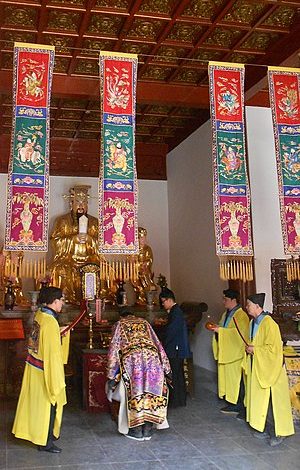Zhengyi Dao

Zhengyi Dao (Chinese: 正一道; pinyin: Zheng Yi Dào), also known as the Way of Orthodox Unity, Teaching of the Orthodox Unity, and Branch of the Orthodox Unity is a Chinese Daoist movement that traditionally refers to the same Daoist lineage as the Way of the Five Pecks of Rice and Way of the Celestial Masters, but in the period of the Tang dynasty and its history thereafter. Like the Way of Celestial Masters (Tianshi Dao), the leader of Zhengyi Daoism was known as the Celestial Master.
The term Zhengyi (Orthodox Unity) has been used since Daoism became an organized religion in 142 AD when Laozi bestowed the Covenant with the Powers of Orthodox Unity (zhengyi mengwei) on Zhang Daoling. Zhang’s followers called his teachings the Way of the Five Pecks of Rice while during the Six Dynasties period, the southern Daoists called it the Way of the Celestial Masters. The Covenant, Five Pecks of Rice, and Celestial Masters all refer to the Zhengyi branch of Daoism but in different periods.[1]
Celestial Master communities suffered from numerous migrations in the late Three Kingdoms and Five Dynasties and Ten Kingdoms periods. Cao Cao resettled them in the north and then they joined mass migrations to the south after the loss of Northern China in 317 to the Uprising of the Five Barbarians. In the 5th century Abridged Codes for the Daoist Community, Lu Xiujing laments that Daoist Assemblies no longer observed the proper rules and the position of libationer had become hereditary. By the Tang dynasty, the title of Celestial Master had been debased to the point where any prominent Daoist could claim the title. Celestial Master priests no longer figured prominently in Daoist texts.[2]
Emperor Xuanzong (712-756) canonized the first Celestial Master Zhang Daoling during his reign. This brought no benefit to the original base of the Celestial Masters in Sichuan, but rather benefited a temple in the Jiangnan area of Jiangxi province. This temple was located at Mount Longhu, claimed to be the spot where Zhang Daoling had obtained the Dao, and where his descendants still lived. Recognized by the emperor as the legitimate descendants of Zhang Daoling, these new Celestial Masters established a new patriarchy at their base of Longhu Shan.[3]
The importance of the Zhengyi school grew during the Song dynasty, with the Celestial masters frequently receiving imperial appointments. In 1239, the Southern Song dynasty’s Emperor Lizong commanded the 35th Celestial Master Zhang Keda to unite the Lingbao School, the Shangqing School and Zhengyi Dao. The new school was to retain the Zhengyi name and remain based at Mount Longhu. Shortly after the schools were united, the Mongols under Kublai Khan conquered the Southern Song dynasty and established the Yuan dynasty in China. He accepted the claim that the Celestial Master of Mount Longhu was descended from Zhang Daoling and granted the school the right to control affairs relating to Daoism in the Jiangnan area. In 1304, as a result of Zhengyi Dao’s increased importance under the Mongols, all of the Daoist schools, with the exception of the Quanzhen School, were united under the banner of the Zhengyi School, with the 38th Celestial Master, Zhang Yucai, as leader.[4]
The founding of the Ming dynasty in 1368 marked the beginning of a long decline in the power of the Zhengyi Daoism. The first Ming ruler, the Hongwu Emperor (1368–98), suppressed the use of the title of ‘Celestial Master’ among the Zhengyi School, and the 50th Celestial Master Zhang Guoxiang had his title stripped by the Longqing Emperor (1567–72).[5] By the Daoguang period (1821–50) of the Qing dynasty, relations between the court and the Celestial Masters came to an end. The school’s activities became localized to regions in which the school was particularly important.[6] Despite ending association with the court, the Celestial Master himself still retained a great deal of prestige and importance among Daoists throughout China.[7] This prestige, which arose from the belief that he was descended from Zhang Daoling, was evident when the Celestial Master traveled and attracted crowds of people wherever he went.[8]
